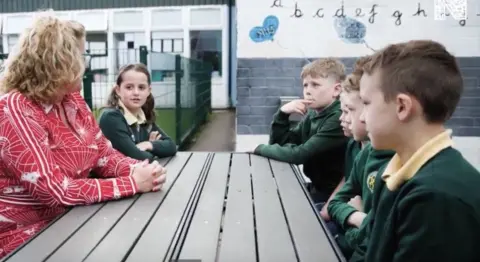Teachers need allergy training, say campaigners
 St Michaels RC Primary School
St Michaels RC Primary SchoolCampaigners are calling for all teachers and school staff to be trained in how to recognise and respond to the signs of an allergic reaction.
Research by the NASUWT teacher's union found 95% of teachers surveyed have children with allergies in their schools - but 67% have had no formal allergy training.
The Welsh government said all schools were provided with guidance on adrenaline auto-injectors and the need for staff to be trained to use them.
Stephanie, whose 12-year-old-son William has severe allergies, said "literally putting your child's life in someone's hands" was "the most nerve-wracking experience ever".
"When my son started primary school, there was no allergy training," she told BBC Radio Wales Breakfast.
"We actually had to arrange for a nurse to come in to show the teachers what to do."
The Natasha Allergy Research Foundation (NARF) charity says the lack of training could mean the difference between life and death in an emergency.
The survey of nearly 1,900 teachers also revealed one in five had never been taught how to use an adrenaline auto-injector and 60% did not know know if their school had an allergy policy.
In addition, NARF research has found 20% of all food allergy reactions occur in schools and hospital admissions for food-induced anaphylaxis have tripled in the past 20 years.
Severe allergies, or anaphylaxis, is when someone can go into anaphylactic shock when exposed to their allergens. Symptoms include swelling of the lips, face and throat and can cause the person to have difficulty breathing.
Stephanie, from Cardiff, added: "You spend your entire life ensuring everything is catered to for your children, that they don't feel different, that they're not excluded from daily activities but, as well as that, they are kept safe.
"So when you're handing them over to anyone really, it needs to be with the confidence that they know what they're doing. That they know how to recognise the signs of an allergic reaction and they will take the action that's needed."
 Stephanie
StephanieJoanna Taylor, head teacher at St Michael's Catholic Primary School in Pontypridd, has several students with allergies, as well as being allergic to fish and nuts herself.
She said the school had individual healthcare plans in place as well as allergy action plans, and medication was kept in the classrooms and labelled with the child's photograph.
She added all school staff were made aware of who had allergies and took part in annually updated training on using autoinjectors.
"[Parents] are handing their children over to us every day, they need to know they're safe," she said.
"We just aim to make it a community understanding - the school cooks, the kitchen staff, my clerk is really good at chasing to find out what allergies are and any training we need.
"It's all about us working together for the safety of the child."
 St Michaels RC Primary School
St Michaels RC Primary SchoolMeilir Ashford, head teacher of Ysgol Gynradd Parc y Llan in Treuddyn, Flintshire, said he had to call two ambulances last month for a pupil with a peanut allergy which he said was "a big shock".
"It was easy for us because we all knew he had an allergy and, even though it was very serious, I have four staff who have had advanced first aid training and we know exactly what to do," he told Radio Cymru's Dros Frecwast programme.
"If the systems were not in place, it could have been a lot more serious than it was."
He said the school community were "very good" at complying with letters urging parents not to send foods containing nuts - one of the most common severe allergens - in packed lunches, adding "we're all singing from the same hymn sheet".
But he admitted staff were "trained to teach, not to be doctors".
Stephanie said, while she could see some attempts to improve allergy training, it had not gone far enough.
She added the campaign was "a long time coming" and she was "hopeful" the calls would be taken seriously, particularly as the number of children with allergies was increasing.
"I feel there has been a tremendous amount of progress, but it hasn't been without the tragedies in the allergy community as well. We have had lives lost at a very young age and, because of this, we're still seeing there's not enough change," she said.
"It shouldn't be up to parents to ensure schools have done their allergy training, it should just be fundamental, basic first aid."
The Welsh government said: "All schools in Wales are provided with guidance on the use of emergency adrenaline auto-injectors in schools.
"The guidance is clear about the need for staff to be trained to administer injectors for emergencies."
